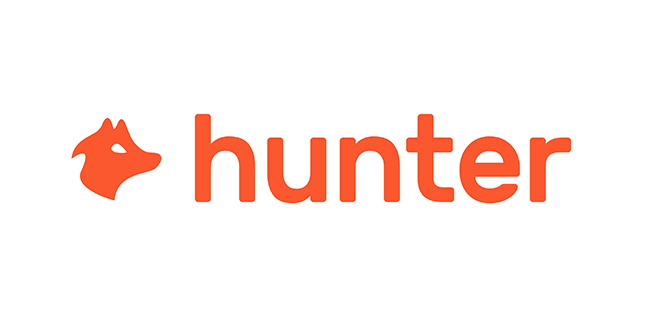I’m excited to announce that as of now, Hunter is natively integrated with Woodpecker. So if you’d like to use the two apps to streamline your email outreach, there’s no need to do it via Zapier (as you would have up till now).
In this article, we’re taking a closer look at Hunter.io, and interviewing Marvin Magusara to find out more about the tool that has been extremely popular around professionals who deal with prospecting.
Keep reading to see if Hunter is the right tool to add to your stack and what you could get out of the Woodpecker + Hunter native integration.
About Hunter
Hunter was founded in France in 2015. It’s a plugin that helps users find email addresses of professionals they want to get in touch with. Hunter crawls the Internet and indexes publicly available email addresses.
Yet, if you’re searching for an email and Hunter can’t find it in the database, it will generate the most likely email address instead, or it will give you the most common email pattern of a company.
Hunter & Woodpecker are now natively integrated
Thanks to the native integration, you no longer need to connect the two apps via Zapier to have the data pushed between them. You can automatically fuel your email campaigns with fresh leads that you’ve found using Hunter with just a few clicks. Simple as that.
The integration is available for Woodpecker users at the Team Pro plan.
But how do you know if Hunter is the right tool for you? Check out the interview with Marvin and our review of the tool.

Marvin Magusara from Hunter.io
What’s the greatest benefit of using Hunter?
Marvin: Without an email finder tool like Hunter, it would be challenging to find the email addresses that you need.
If you want to work with a company, you’d need to send a staff member to the company HQs just to ask for contact details. This would be a waste of valuable resources, like time, or even nigh on impossible for international companies. So why won’t you use an email or a phone instead?
Hunter allows you to quickly find and verify an email address for a company or website, specify by staff name or positions. Our email verification process ensures that the email address is verified by multiple sources, so you don’t get bounces and damage your domain reputation.
We’re glad that Hunter is used by over 1.5 million professionals. That’s an impressive number. It has already been tried and tested by millions of people which is a feat on its own.
How does the process of building a database look with Hunter?
Marvin: You can search for email addresses either in bulk or individually. It’s pretty easy.
To search for an individual email, just enter the domain name at https://hunter.io/ or specifically enter domain name + name and surname of the person whose email address you are looking for. Hunter will present you the most viable options.
To find email addresses in bulk, you simply import a list of domains and Hunter will output all the emails found for the sites on that list.
Do I need any additional tools or add-ons to use Hunter.io efficiently?
Marvin: You can download our Chrome extension or Firefox add-on. Also, if you like, you can use one of our native integrations with popular CRMs. Nevertheless, having a CRM is not necessary to use Hunter.
What kind of information can I actually collect using Hunter?
Marvin: Hunter crawls the internet and indexes publicly available email addresses, which you can then access via a simple user interface.
With the Domain Search you can find publicly available email addresses associated with a domain and, when available, full name, phone number, job title, company name, website, Twitter profile, LinkedIn profile.
Hunter will also show the sources, i.e. where exactly it was found. If Email Finder won’t be able to find the email address you’re looking for in the base, it will generate the most likely email address instead. The confidence score, i.e. the probability of the email address being valid, is updated accordingly in both cases.
You may also use bulk finding and verification or see what’s the most common email pattern of a company.
How many contacts can I have per month?
Marvin: There are no limits as to how many contacts you can have per month. Hunter will provide you with an unlimited list of contacts for your email marketing strategy.
How much is it?
Marvin: Hunter has multiple subscription options. You can choose from Free, Starter, Growth, Pro, and Enterprise plans. The price depends on how many requests you’d want to have.
Is there a free trial?
Marvin: There is a free plan which includes 50 requests per month. There are a lot of plans that you can subscribe to after you’ve decided to go with Hunter.
For example, a Starter subscription option if your company is still just starting your email marketing strategy. You can, however, totally scale this to as big as an Enterprise subscription.
Since this interview was taken, Hunter rolled out a new feature – Campaigns – that allows you to create simple email campaigns. For obvious reasons we don’t use it at Woodpecker, but it’s an important one, so I thought I’d mention it here.
Our experience with Hunter
THINGS WE LOVED
The Chrome extension
This is one of the things we loved the most about Hunter: when you visit a website, it’s enough to click Hunter’s Chrome Extension and a list of email addresses pops up right in your browser.
Hunter shows you all the email addresses found on the Internet associated with the domain name of the site you’re currently on. You can then add them to your prospect list by clicking the “+” next to the email address.
Sources
Another feature worth mentioning here is that Hunter provides you a list of detailed sources, i.e. places on the web where the email address was found, as well as its discovery date and additional information, if it’s publicly available.
This is a great feature because you can see for yourself if they’re up to date, and it actually has one more perk: it gives you an idea where to search for other email addresses on the internet.
Freemium model
Hunter offers a free plan in which you get 50 free requests per month, and once your account cycle is over, your plan renews at no cost. This means you get to have your cookie and eat it too: you can make good use of what Hunter offers and it won’t cost you a penny.
However, note that – as it usually is with freemium services – not all features are available with the free subscription. You can use the Campaigns, Email Verifier, Email Finder and Domain Search, as well as the Bulk Email Verification and Bulk Email Finder, but to use the Bulk Domain Search you need to have a paid account. CSV exports are also unavailable for unpaid users.
Effectiveness of the searches
Hunter is the tool we go to when traditional research or other tools have proven ineffective. It has helped us many times to find impossible contacts.
Keep in mind, though, that Hunter may not be as effective in finding contact details when it comes to smaller, less known companies, as Hunter’s database might not have their contact information yet. It is, though, constantly growing and being updated.
Easy to understand & use
Hunter is super easy to use and digs out the contact information in a split second. We liked the simple and user-friendly interface and the intuitiveness of the tool.
For example, Hunter uses three confidence markings to show you the estimation of whether the email address is valid or not: a green dot, a yellow one, and a red one. If something’s off, you’ll see the reason listed in the same color as the mark the email address got.
It may not be new, may not be innovative, but it’s the small things like this that make a product a pleasure to use.
No finds, no requests wasted
If a search in the Email Finder or Domain Search doesn’t return any finds, the request isn’t counted.
THINGS THAT STILL COULD BE IMPROVED
The lack of duplicate detection
As much as we love using Hunter, there are still some things that could use a little improvement. One of them is the lack of duplicate detection, which means you can actually add the same prospect twice to your list.
Unused requests don’t roll over
If you don’t use them, you lose them. The number of requests resets at the beginning of your account cycle, and the leftover requests don’t roll over to the next one.
The only exception is when you’re upgrading or downgrading your current plan. In these cases, any requests you have left will be automatically rolled over on top of the new ones. This isn’t that big a deal, and we get it that it’s a business decision, but still – this could be improved for the paid subscriptions.
Emails found are not verified
After you’ve got an email address from a Domain Search, you get an estimation of the probability that it’s actually valid. It may be one of the three: deliverable (it gets a green dot), risky (a yellow dot), or invalid (those get a red dot). When you hover over them, you’ll see the probability shown in an exact percentage.
The thing is, though, that the confidence scores assigned to them are only an estimation. And even though they are constantly updated to make sure they’re accurate, Hunter suggests using the Email Verifier to further verify the email addresses. This means you have to use another request to verify the email address you got from the search.
To sum up
- Hunter is a useful prospecting solution, and thanks to the Chrome extension and Firefox add-on it makes collecting your prospects’ contact data even more simple and faster.
- You may run the found email addresses through an additional verifier, which Hunter strongly encourages its users to do. Every verification will cost you another request.
- You can stick with freemium, getting 50 requests per month is perfectly enough for beginners.
- It may prove especially effective when you’re searching for impossible contacts; it may not, however, be as efficient when it comes to gathering data of professionals working in smaller companies.
- For every email address found, you also get a list of detailed sources with a date when exactly it was found and where on the web.
- The tool lacks duplicate detection, which is a bummer because it means you can actually add the same contact data twice to your list.
- You can search for email addresses and verify them in bulk, which may be a huge time-saver.
- It’s integrated with some of the top CRMs.
All in all, we find Hunter very useful. We’ve been using it here at Woodpecker for some time now and, honestly – we wish we had more reasons to use it.
Try giving it a go and use Hunter with Woodpecker. This combination could streamline your cold mailing process.
READ ALSO

How to Build a Quality Prospect Base for Outbound: 5-Step Tutorial
In 2016, I wrote around 20 posts about prospecting tools and tactics. I decided to prepare a little synthesis of the prospecting know-how I've shared with you so far. Here's the outbound prospecting process divided into 5 steps.

How Data-driven Selling and Personalization Can Boost Your Outbound
I like to stress out the importance of cold email personalization. You may approach the process of adding a personal touch to email copy from multiple angles, which I've already described. But sometimes it's nice to use a tool or two that would do it for you. I asked Moaaz from Cloudlead, a B2B lead generation intelligence provider, to explain you how to use data to drive your marketing and sales efforts. Moaaz will take over from now.

Personal Touch Email in Sales: 3 Steps to Write It
Three questions: What's the little big thing that makes our cold email interesting from the very first line? What makes our prospect feel that we really care about talking to them? What changes generic bulk emails into personal valuable messages? One answer: Personal touch. And note that putting in our addressee's first name in the salutation is not enough nowadays. Here's how to add a personal touch to a cold email campaign in 3 steps.

